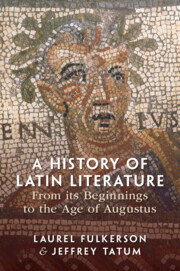Book contents
- A History of Latin Literature from its Beginnings to the Age of Augustus
- A History of Latin Literature from its Beginnings to the Age of Augustus
- Copyright page
- Contents
- Maps
- Acknowledgements
- Chronology
- Abbreviations
- Sidebars
- Maps
- Introduction
- Chapter 1 Romanised Muses: The Birth of Latin Literature
- Chapter 2 All the World’s a Stage: Roman Republican Drama and Theatrical Traditions
- Chapter 3 A Good Man Skilled in Speaking: Oratory and Rhetoric in Rome
- Chapter 4 Song of Myself: The Personal Voice in Republican Literature
- Chapter 5 To Educate and to Entertain: Didactic and the Arrangement of Knowledge
- Chapter 6 What’s Past Is Prologue: History and Biography
- Chapter 7 Moments of Glad Grace: Augustan Love Poetry
- Chapter 8 Gods, Monsters, and Heroes: Augustan Epic
- Chapter 9 Further Voices: Augustan Personal Poetry
- Coda
- Glossary of Names and Terms
- Index Locorum
- Index Nominum
- General Index
Coda
Published online by Cambridge University Press: 14 November 2024
- A History of Latin Literature from its Beginnings to the Age of Augustus
- A History of Latin Literature from its Beginnings to the Age of Augustus
- Copyright page
- Contents
- Maps
- Acknowledgements
- Chronology
- Abbreviations
- Sidebars
- Maps
- Introduction
- Chapter 1 Romanised Muses: The Birth of Latin Literature
- Chapter 2 All the World’s a Stage: Roman Republican Drama and Theatrical Traditions
- Chapter 3 A Good Man Skilled in Speaking: Oratory and Rhetoric in Rome
- Chapter 4 Song of Myself: The Personal Voice in Republican Literature
- Chapter 5 To Educate and to Entertain: Didactic and the Arrangement of Knowledge
- Chapter 6 What’s Past Is Prologue: History and Biography
- Chapter 7 Moments of Glad Grace: Augustan Love Poetry
- Chapter 8 Gods, Monsters, and Heroes: Augustan Epic
- Chapter 9 Further Voices: Augustan Personal Poetry
- Coda
- Glossary of Names and Terms
- Index Locorum
- Index Nominum
- General Index
Summary
It is all too easy to view the achievements of the late republic and Augustan Age as pinnacles of Latin literature, and indeed many critics have done so. We are all entitled to our own tastes, but it is reductive if not actually misleading to think of Latin literature as something which evolves in ever more elevated stages from Livius Andronicus, Naevius, and Ennius to Vergil, Horace, and Ovid – or from the elder Cato to Cicero, Sallust, and Livy. Indeed, this was by no means the opinion of every Augustan reader, as we can see in Epistle 2.1, a poetic letter from Horace to Augustus. There the poet complains that the public prefers the classics of the second century to contemporary writing and urges Augustus to do something about this resistance to modern literature.
- Type
- Chapter
- Information
- Publisher: Cambridge University PressPrint publication year: 2024

